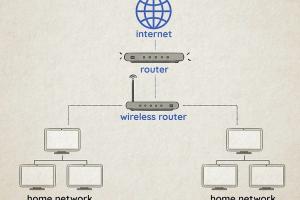Mastering Computer Networking: A Comprehensive Guide for Beginners

-
Quick Links:
- Introduction
- What is Computer Networking?
- Importance of Networking
- Basic Concepts of Computer Networking
- Key Networking Protocols
- How to Start Learning Computer Networking
- Recommended Online Resources
- Case Studies in Networking
- Expert Insights
- FAQs
Introduction
In an increasingly interconnected world, understanding computer networking is crucial for anyone looking to build a career in technology. Computer networking encompasses the hardware and software that allows computers to communicate, share resources, and access the internet. This guide serves as a roadmap for aspiring network professionals, providing a comprehensive overview of how to learn computer networking effectively.
What is Computer Networking?
Computer networking refers to the practice of connecting computers and other devices to share data and resources. This includes everything from small home networks to large enterprise systems. Key components of networking include:
- Nodes: The devices connected to the network.
- Links: The connections between nodes.
- Protocols: The rules governing data transmission.
Importance of Networking
Understanding networking is vital for various reasons:
- Career Opportunities: Networking skills are in high demand across industries.
- Problem-Solving: Networking knowledge helps troubleshoot connectivity issues.
- Security: Understanding networking enhances your ability to protect systems from cyber threats.
Basic Concepts of Computer Networking
Before diving deeper into networking, it's essential to grasp some basic concepts:
1. Types of Networks
- LAN (Local Area Network): A network limited to a small geographic area.
- WAN (Wide Area Network): Covers a broad area, often connecting multiple LANs.
- MAN (Metropolitan Area Network): Spans a city or a large campus.
2. Network Topologies
Network topology refers to the layout of the network. Common topologies include:
- Star Topology
- Bus Topology
- Ring Topology
3. IP Addressing
IP addressing is crucial for identifying devices on a network. Understanding IPv4 and IPv6 formats is essential.
Key Networking Protocols
Networking protocols define the rules for data transmission. Key protocols include:
- TCP/IP: The foundational protocol suite for the internet.
- HTTP/HTTPS: Protocols for web traffic.
- FTP: For transferring files between systems.
How to Start Learning Computer Networking
Learning computer networking can seem daunting. Here’s a step-by-step guide to help you start:
Step 1: Understand the Basics
Begin with fundamental concepts. Free resources like Khan Academy offer excellent introductory material.
Step 2: Get Hands-On Experience
Practical experience is invaluable. Set up a home lab using virtual machines or physical devices. Tools like GNS3 and VirtualBox can help simulate network environments.
Step 3: Take Online Courses
Platforms like Coursera and Udemy offer structured courses. Consider certifications like CCNA for formal recognition of your skills.
Step 4: Join Networking Communities
Participate in forums and online communities. Websites like Reddit have active networking discussions.
Recommended Online Resources
Here are some high-quality resources to further your learning:
- Cybrary - A platform for free networking courses.
- Pluralsight - Offers networking courses with expert instructors.
- Network World - Latest news and technologies in networking.
Case Studies in Networking
To truly grasp networking, analyzing real-world applications is beneficial. Here’s a look at a few case studies:
1. Cisco's Networking Solutions
Cisco has revolutionized networking with its robust solutions for businesses, showcasing how effective networking can enhance productivity.
2. The Evolution of Internet Protocols
Understanding the transition from IPv4 to IPv6 can illustrate the importance of addressing in a growing digital landscape.
Expert Insights
We spoke with networking professionals to gather insights on effective learning strategies:
"The best way to learn networking is to do it. Build your own lab and experiment. Don't be afraid to make mistakes; they are your best teachers." - John Doe, Network Engineer
FAQs
1. What is the best way to start learning computer networking?
Start with the basics through online courses and hands-on experience in a lab setting.
2. Are there any free resources available for learning networking?
Yes, platforms like Khan Academy and Cybrary offer free courses on networking fundamentals.
3. What certifications should I pursue for a career in networking?
Consider starting with CompTIA Network+ and then pursuing Cisco CCNA for more advanced knowledge.
4. How long does it take to learn computer networking?
Learning networking can take several months to years, depending on your pace and the depth of knowledge you seek.
5. What are the common networking protocols I should know?
Key protocols include TCP/IP, HTTP/HTTPS, and FTP.
6. Is hands-on experience important in networking?
Absolutely! Practical experience helps solidify your understanding and prepares you for real-world scenarios.
7. Can I learn networking online?
Yes, there are numerous online courses and resources that can help you learn networking effectively.
8. What tools can I use to practice networking skills at home?
Tools like GNS3, Cisco Packet Tracer, and VirtualBox are excellent for simulating networks.
9. Are there online communities for networking enthusiasts?
Yes, platforms like Reddit and various forums provide spaces for networking discussions and support.
10. How important is networking in today's job market?
Networking skills are highly valued in many technology-related careers, making them essential for job seekers.
Random Reads
- How to sync cell phones
- How to sync ps4 controller
- Mastering iphone ipad reminders
- Mastering initiative in dnd 5e
- No bootable devices found error
- How to paint over silicone caulk
- How to paint stainless steel
- How to remove sticker from stainless steel
- How to return a steam game
- How to return an item to amazon